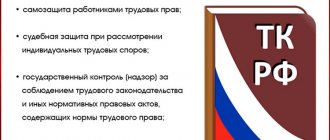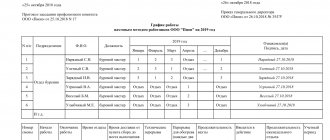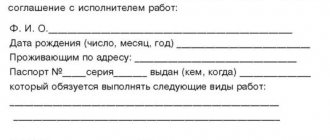Subject, method, principles and sources of labor law
Labor law regulates social relations arising in the sphere of hired labor. Labor relations cover relationships based on a mutual agreement between the employee and the employer on the personal performance by the employee for payment of a labor function, the employee’s subordination to internal labor regulations while the employer provides working conditions provided for by labor legislation and other regulatory legal acts containing labor law norms, a collective agreement , agreements, local regulations, employment contracts. In general, the following areas of social relations can be identified, which are included in the subject of legal regulation of labor law:
- labor relations between the employee and the employer in connection with the employee’s performance of his labor function;
- relations in the field of management and labor organization;
- relations related to employment and employment;
- relations in the field of social partnership;
- relations in the field of professional growth of the employee (advanced training, retraining, etc.);
- state control and supervision in the field of labor.
Thus, the main participants in labor relations are the employee and the employer. However, labor law ensures compliance with state interests in the field of social partnership and the labor rights of citizens enshrined in the Constitution of the Russian Federation. Therefore, the state represented by authorized public authorities can also be included among the participants in labor relations.
Taking the method of labor law as a set of techniques and methods of legal regulation of labor relations, it can be characterized by a specific combination of imperative and dispositive principles (with a significant predominance of the latter). In regulating labor relations, local (within the enterprise) and contractual methods are actively used.
The basic principles of labor law include:
- freedom of labor, i.e. everyone freely chooses a profession and type of activity, manages their ability to work;
- prohibition of forced labor and discrimination in labor;
- protection from unemployment by the state and assistance in employment;
- ensuring the right of every employee to fair working conditions, including working conditions that meet safety and hygiene requirements, the right to rest, including limitation of working hours, provision of daily rest, days off and non-working holidays, paid annual leave;
- ensuring the right of every employee to timely and full payment of fair wages that ensure a decent human existence for himself and his family, not lower than the minimum wage established by federal law;
- ensuring equal opportunities for workers, without any discrimination, for promotion at work, taking into account labor productivity, qualifications and length of service in their specialty, as well as for training and additional professional education;
- ensuring the right of workers and employers to associate to protect their rights and interests, including the right of workers to create and join trade unions;
- ensuring the right of employees to participate in the management of the organization in the forms provided by law;
- a combination of state and contractual regulation of labor relations and other relations directly related to them;
- mandatory compensation for harm caused to an employee in connection with the performance of his job duties;
- establishment of state guarantees to ensure the rights of workers and employers, implementation of state control (supervision) over their compliance;
- ensuring everyone's right to protection by the state of their labor rights and freedoms, including judicial protection;
- ensuring the right to compulsory social insurance of workers.
Regulation of labor relations is carried out by sources of labor law: the Constitution of the Russian Federation, the Labor Code of the Russian Federation dated December 30, 2001 No. 197 FZ (Labor Code of the Russian Federation), regulatory acts of the constituent entities of the Russian Federation, by-laws containing norms of labor legislation, legal acts of local governments, collective agreements, agreements and local regulations containing labor law norms.
Labor law does not regulate the performance of official duties by military personnel, the activities of members of the board of directors, or civil contractual relations in the field of performance of work and services.
Labor violations
Non-compliance with the law is widespread. In most cases, this is due to the dishonest intentions of employers. Less often, this is explained by ignorance of legal norms and the nature of responsibility for their violation.
If an employee’s rights are not respected, he can contact the inspectorate, the prosecutor’s office, or sue. This possibility is also secured legally. In the vast majority of cases, violations are due to the employer’s failure to comply with its obligations.
Common examples:
- Hiring without concluding a contract;
- Inconsistency of conditions at the enterprise with safety and hygiene standards;
- Refusal to compensate for damage caused to an employee’s health in the workplace;
- Late payment of wages or incomplete accrual;
- Refusal to provide vacations and sick leave;
- Involvement in overtime work;
- Employment without compulsory insurance.
For failure to comply with established standards, unscrupulous employers, as a rule, are subject to disciplinary and financial penalties.
In some cases, administrative and criminal penalties are provided. To do this, the guilt of the offender must be reliably established. Labor legislation is understood as a list of regulations governing the relationship between employers, employees and the state. Their main goals are to create conditions for employment of the population, respect for the rights and freedoms of employees, managers, and owners of enterprises, and the comprehensive development of the described area. The implementation of these directions is possible only if fundamental problems are solved in accordance with established principles.
Concept and terms of an employment contract
The most important role in building social partnership is played by a collective agreement, i.e. a legal act regulating social and labor relations in an organization or an individual entrepreneur and concluded by employees and the employer represented by their representatives.
The collective agreement regulates the obligations of employees and the employer in the following aspects of labor activity:
- forms, systems and amounts of remuneration, as well as payment of benefits and compensation;
- a mechanism for indexing wages taking into account rising prices, inflation levels, and fulfillment of indicators determined by the collective agreement;
- working time and rest time, including issues of granting and duration of vacations;
- environmental safety and health protection of workers at work;
- health improvement and recreation for employees and members of their families;
- partial or full payment for food for employees;
- refusal to strike if the relevant conditions of the collective agreement are met, etc.
Taking into account possible changes in social conditions, the Labor Code of the Russian Federation limits the validity of a collective agreement to three years.
Thus, the collective agreement plays the role of a basis for building individual labor relations between specific employees and the employer, which are fixed in the form of an individual employment contract.
According to Art. 56 of the Labor Code of the Russian Federation, an employment contract is an agreement between an employer and an employee, according to which the employer undertakes to provide the employee with work for a specified labor function, to provide working conditions provided for by labor legislation and other regulatory legal acts containing labor law norms, a collective agreement, agreements, local regulations and this agreement, pay the employee wages in a timely manner and in full, and the employee undertakes to personally perform the labor function defined by this agreement and comply with the internal labor regulations in force for this employer.
As the main document regulating the relationship between an employee and an employer, an employment contract, in addition to information about the parties entering into it, must contain the following conditions:
- place and working conditions;
- employee's labor function;
- work start date;
- terms of remuneration, including the size of the tariff rate, salary, allowances, incentive payments;
- working hours and rest hours;
- guarantees and compensation for work under harmful and dangerous working conditions;
- condition on compulsory social insurance of the employee.
In addition to the specified mandatory conditions, the employment contract may also provide for additional conditions, for example, a probationary period, non-disclosure by the employee of state or official secrets, etc.
An employment contract is considered fixed-term if it is concluded for a certain period (no more than five years). It is also possible to conclude an open-ended employment contract.
As a general rule, an employment contract can be concluded with an employee who is already sixteen years old. The work of minor workers is characterized by a lighter working regime.
Labor activity is also possible for persons under sixteen years of age: from fifteen years of age - in case of receiving general education; from the age of fourteen - to perform light labor during free time from receiving education; up to fourteen years - in cinematography organizations, theaters, theatrical and concert organizations, circuses, with the consent of one of the parents and the permission of the guardianship and trusteeship authority.
An employment contract may be terminated on the following grounds:
- agreement of the parties (at any time during the term of the employment contract);
- expiration of the employment contract (otherwise, the continuation of the actual employment relationship and the absence of a requirement to terminate it will mean that these relationships continue indefinitely);
- termination of an employment contract at the initiative of the employee (the so-called “at his own request”, when the employee has the right to terminate the employment contract by notifying the employer in writing no later than two weeks);
- termination of an employment contract at the initiative of the employer, both due to the fault of the employee (in case of absenteeism, the employee showing up at work under the influence of alcohol or drugs, etc.), and without his fault (in case of liquidation of the organization, reduction of staff, etc.);
- transfer of an employee, at his request or with his consent, to work for another employer or transfer to elective work;
- the employee’s refusal to continue working due to a change in the owner of the organization’s property;
- the employee’s refusal to continue working due to a change in the terms of the employment contract determined by the parties;
- the employee’s refusal to transfer to another job, which is necessary for him in accordance with the medical report, or the employer does not have the appropriate job;
- the employee’s refusal to be transferred to work in another location together with the employer;
- circumstances beyond the control of the parties (an employee’s conscription for military service, failure to be elected to a position, the occurrence of emergency circumstances that prevent the continuation of labor relations, etc.)
Item
Labor law of the Russian Federation is the labor relations of citizens arising on the basis of legal precedent and existing and developing within the framework of the nomenclature production of labor law.
The subject of labor law answers the question of what this industry regulates and what types of social relations in labor.
The concept and importance of labor law in the life of society is almost impossible to overestimate. It creates a structure of clarity and systematic functioning of all social manifestations that are permeated with labor relations.
Without the development of this most important sphere of social activity, the entire legal system will become amorphous and blurred, and production processes will lose their ability to function.
Legal regulation of working time and rest time
In addition to the direct performance of the labor function, the employee’s responsibilities include compliance with labor discipline, i.e., submission to the rules of behavior defined in accordance with the law, collective agreement, agreements, local regulations, and employment contracts. The employer must create conditions for such lawful behavior of the employee.
The labor collective of each enterprise is guided by a special local act - internal labor regulations, which is attached to the collective agreement. Internal labor regulations regulate the procedure for hiring and dismissing employees, the basic rights, duties and responsibilities of the parties to an employment contract, working hours, rest periods, incentives and penalties applied to employees, as well as other issues of regulating labor relations at a particular enterprise.
One of the fundamental tasks in the organization of labor at an enterprise, which has social and economic significance, is the determination of working hours during which the employee, in accordance with the internal labor regulations and the terms of the employment contract, must perform his labor duties. According to Art. 91 of the Labor Code of the Russian Federation, working hours are limited to 40 hours per week, the so-called. normal working hours, which are distributed depending on a six- or five-day working week.
However, labor legislation obliges the employer to establish reduced working hours for the following categories of employees:
- minor workers;
- disabled workers;
- workers working in harmful and dangerous working conditions;
Short working hours should be distinguished from part-time working hours, which are established by agreement between the employee and the employer. The Labor Code of the Russian Federation obliges the employer to establish a part-time working day or week at the request of a pregnant woman, one of the parents of a child under the age of fourteen, or a disabled child, due to the need to care for a sick family member. However, unlike reduced working hours, when working part-time, the employee's pay is proportionately reduced.
All categories of workers have the right to a working day shortened by one hour on the eve of non-working holidays and weekends.
Of course, the nature of the enterprise’s activities may require employees to perform labor functions at night or beyond normal working hours. The employee's rights to fair working conditions must be respected in such cases. Thus, the duration of night work is reduced by one hour, and some categories of workers are not allowed to work at night, for example, pregnant women and minor workers.
Exceeding the normal working hours is possible in the case of overtime work, which is occasionally performed by the employee at the initiative of the employer outside the working hours established for the employee, or in the case of work on irregular working hours.
An employer can involve an employee in overtime work both with his consent (if it is necessary to finish work, if a replacement worker fails to appear in conditions of continuous work, etc.), and without his consent (when performing work necessary to prevent a disaster, during the performance of work , the need for which is due to the introduction of a state of emergency or martial law, etc.). Overtime work cannot be performed for more than 4 hours on two consecutive days and 120 hours per year.
Another regime, which implies the possibility of exceeding normal working hours, is associated with work on irregular working hours, according to which individual employees may, by order of the employer, if necessary, be occasionally involved in the performance of their labor functions outside the established working hours. We are talking primarily about workers in the sphere of management, administration, and specific forms of labor (agents, consultants, etc.).
Labor legislation guarantees the right of workers to rest by regulating the rest period during which the employee is free from performing work duties and which he can use at his own discretion. Rest time includes: breaks during the working day (at least 30 minutes a day), daily rest, weekends (weekly continuous rest, which cannot be less than 42 hours), non-working holidays, vacation.
Annual leaves are provided to employees while maintaining their place of work and average earnings, on the terms of payment for rest time. Article 115 of the Labor Code of the Russian Federation establishes the duration of annual paid leave - 28 calendar days. However, the employer can also provide additional paid leave to employees engaged in work with harmful or dangerous working conditions, or in connection with production and financial opportunities.
An employee has the right to the first paid leave after six months of work at the enterprise, with the exception of such categories of employees as pregnant women, minors, etc., for whom paid leave can be provided before this period.
The presence of paid annual leave does not mean that an employee, for good reasons, cannot apply for additional leave without pay, the refusal of which by the employer for certain categories of employees is unlawful.
Content
Labor law contains the legal basis for the emergence, continuation or termination of employment relationships. The content of labor law is determined by:
- Legal relations related to work in a specific position with an established staffing schedule.
- Contents of the work schedule.
- Contents of labor conditions and terms of the employment agreement.
- Contents of conditions for professional training and advanced training.
- Contents of the conditions for supervision over the activities of employees.
- Contents of the protection of workers' rights and rules for the consideration of labor disputes.
Legal regulation of wages
We pay the employee for his work, that is, it is performed on the terms of material remuneration, the amount of which is established by the employment contract and depends on the following parameters:
- employee qualifications;
- complexity, quantity, quality and conditions of the work performed;
- possible compensation payments, i.e. additional payments and allowances for working in difficult conditions;
- incentive payments, i.e. bonuses, additional payments, allowances and incentive payments.
Wages are the most important factor in the economic and social development of the region and the country as a whole. The minimum wage is guaranteed by the state, is established throughout the country, is regularly indexed and cannot be lower than the subsistence level of the working population. Other state guarantees of socially fair wages enshrined in the Labor Code of the Russian Federation are: measures to ensure an increase in the level of real wages; restriction of the employer's right to withhold wages; limitation of remuneration in kind; state supervision and control over the full and timely payment of wages, etc.
Article 136 of the Labor Code of the Russian Federation regulates the payment of wages. When paying wages, the employer is obliged to notify in writing (in the form of a payslip) each employee not only about the final amount of payment, but also about the structure of wages, the size of its components, the amount and justification for deductions made. Payment cannot be made in the form of coupons, promissory notes, etc. The main form of payment of wages is the national currency, however, payment of labor partially (up to 20%) can be carried out in non-monetary form. Salaries are paid at least every half month. The day of payment of wages is established by internal labor regulations, collective agreement, and employment contract. If this day falls on a weekend or holiday, wages are paid the day before. Vacation payment is made no later than three days before the start of the vacation.
Enterprises themselves determine their remuneration systems for different categories of workers. Typically, there are two methods of calculating wages: time-based and piece-rate wage systems. Each of the systems may contain mechanisms for monetary stimulation of the employee: in addition to simple time-based and direct piece-rate remuneration systems, time-based bonus, piece-rate bonus, and piece-rate progressive remuneration systems are used.
In addition, the Labor Code of the Russian Federation introduces the concept of tariff systems of remuneration, i.e., remuneration systems based on the tariff system of differentiation of wages for workers of different categories. The basis of the enterprise's tariff system is the tariff schedule - a set of tariff categories of work (professions, positions), determined depending on the complexity of the work and the requirements for the qualifications of workers using tariff coefficients.
Table of contents
- Part 1 of the Labor Code of the Russian Federation Section 1. General provisions Chapter 1. Basic principles of labor legislation (Articles 1-14)
- Chapter 2. Labor relations, parties to labor relations, grounds for the emergence of labor relations (Articles 15-22)
- Part 2 of the Labor Code of the Russian Federation Section 2. Social partnership in the sphere of labor Chapter 3. General provisions (Articles 23-28)
- Chapter 4. Representatives of workers and employers in social partnership (Articles 29-34)
- Chapter 5. Social partnership bodies (Articles 35-35.1)
- Chapter 6. Collective Bargaining (Articles 36-39)
- Chapter 7. Collective agreements and agreements (Articles 40-51)
- Chapter 8. Participation of employees in the management of the organization (Articles 52-53.1)
- Chapter 9. Responsibility of the parties to the social partnership (Articles 54-55)
- Part 3 of the Labor Code of the Russian Federation Section 3. Employment contract Chapter 10. General provisions (Articles 56-62)
- Chapter 11. Conclusion of an employment contract (Articles 63-71)
- Chapter 12. Amendment of the employment contract (Articles 72-76)
- Chapter 13. Termination of an employment contract (Articles 77-84.1)
- Chapter 14. Protection of employee personal data (Articles 85-90)
- Chapter 15. General provisions (Articles 91-99)
- Chapter 17. General provisions (Articles 106-107)
- Chapter 20. General provisions (Articles 129-132)
- Chapter 23. General provisions (Articles 164-165)
- Chapter 29. General provisions (Articles 189-190)
- Chapter 31. General provisions (Articles 195.1-197)
- Chapter 33. General provisions (Articles 209-210)
- Chapter 37. General provisions (Articles 232-233)
- Part 4 of the Labor Code of the Russian Federation Section 12. Peculiarities of labor regulation for certain categories of workers Chapter 40. General provisions (Articles 251-252)
- Chapter 41. Peculiarities of labor regulation for women and persons with family responsibilities (Articles 253-264)
- Chapter 42. Peculiarities of labor regulation for workers under the age of eighteen (Articles 265-272)
- Chapter 43. Features of labor regulation of the head of the organization and members of the collegial executive body of the organization (Articles 273-281)
- Chapter 44. Peculiarities of labor regulation for persons working part-time (Articles 282-288)
- Chapter 45. Peculiarities of labor regulation for workers who have entered into an employment contract for a period of up to two months (Articles 289-292)
- Chapter 46. Peculiarities of labor regulation for workers engaged in seasonal work (Articles 293-296)
- Chapter 47. Peculiarities of labor regulation for persons working on a rotational basis (Articles 297-302)
- Chapter 48. Peculiarities of labor regulation of workers working for employers - individuals (Articles 303-309)
- Chapter 48.1. Peculiarities of labor regulation of persons working for employers - small businesses that are classified as micro-enterprises (Articles 309.1-309.2)
- Chapter 49. Peculiarities of labor regulation for homeworkers (Articles 310-312)
- Chapter 49.1. Peculiarities of labor regulation for remote workers (Articles 312.1-312.5)
- Chapter 50. Peculiarities of labor regulation for persons working in the Far North and equivalent areas (Articles 313-327)
- Chapter 50.1. Peculiarities of labor regulation for workers who are foreign citizens or stateless persons (Articles 327.1-327.7)
- Chapter 51. Features of labor regulation for transport workers (Articles 328-330)
- Chapter 51.1. Peculiarities of labor regulation for workers engaged in underground work (Articles 330.1-330.5)
- Chapter 52. Features of regulation of labor of teaching staff (Articles 331-336)
- Chapter 52.1. Peculiarities of labor regulation for scientists, heads of scientific organizations, and their deputies (Articles 336.1-336.3)
- Chapter 53. Features of labor regulation of workers sent to work in diplomatic missions and consular offices of the Russian Federation, as well as in representative offices of federal executive authorities and government agencies (Articles 337-341)
- Chapter 53.1. Features of the regulation of the labor of workers sent temporarily by the employer to other individuals or legal entities under an agreement on the provision of labor for workers (personnel) (Articles 341.1-341.5)
- Chapter 54. Peculiarities of labor regulation for employees of religious organizations (Articles 342-348)
- Chapter 54.1. Peculiarities of labor regulation for athletes and coaches (Articles 348.1-348.12)
- Chapter 55. Peculiarities of labor regulation of other categories of workers (Articles 349-351.5)
- Part 5 of the Labor Code of the Russian Federation Section 13. Protection of labor rights and freedoms. Consideration and resolution of labor disputes. Responsibility for violation of labor legislation and other acts containing labor law norms Chapter 56. General provisions (Article 352)
- Chapter 57. State control (supervision) and departmental control over compliance with labor legislation and other regulatory legal acts containing labor law norms (Articles 353-369)
- Chapter 58. Protection of labor rights and legitimate interests of workers by trade unions (Articles 370-378)
- Chapter 59. Self-defense of labor rights by employees (Articles 379-380)
- Chapter 60. Consideration and resolution of individual labor disputes (Articles 381-397)
- Chapter 61. Consideration and resolution of collective labor disputes (Articles 398-418)
- Chapter 62. Liability for violation of labor legislation and other acts containing labor law norms (Article 419)
- Part 6 of the Labor Code of the Russian Federation Section 14. Final provisions (Articles 420-424)
Disciplinary and financial liability
Labor legislation distinguishes two types of liability: disciplinary and material.
Disciplinary liability is established for the commission of a disciplinary offense, i.e. failure or improper performance by an employee through his fault of his labor duties. The employer has the right to apply the following sanctions against an employee who has committed a disciplinary offense:
- comment;
- rebuke;
- dismissal for appropriate reasons.
Dismissal is applied as a sanction for such offenses as a one-time gross violation by an employee of labor duties, which includes absenteeism, the appearance of an employee at work in a state of alcohol, drug or other toxic intoxication, theft (including minor) of someone else’s property at the place of work and etc. The dismissal of the head of an organization (branch, representative office), his deputies and the chief accountant is applied if they make an unfounded decision that results in damage to the organization’s property.
The application of a disciplinary sanction must be preceded by a requirement for the employee to provide a written explanation. The statute of limitations for applying a disciplinary sanction is six months; in the case of an inspection of financial and business activities or an audit, it is two years.
Material liability consists of the obligation to compensate for material damage and can be assigned to both the employee and the employer.
The employer is obliged to compensate for material damage to the employee in the following cases:
- illegal deprivation of an employee’s opportunity to perform a job function (illegal dismissal, suspension from work, delay in issuing a work book);
- delay in payment of wages and other payments due to the employee.
When causing damage to the employer, the employee only compensates for direct actual damage, but not for lost profits. The grounds for releasing an employee from financial liability for damage caused are:
- irresistible force;
- normal business risk;
- extreme necessity;
- necessary defense;
- failure by the employer to fulfill the obligation to provide appropriate conditions for storing property entrusted to the employee.
If the employer compensates the employee for damage in full, then the employee’s financial liability is limited to the average monthly earnings. Full financial responsibility is assigned to the employee only in certain cases, for example, in the event of a shortage of valuables, intentional damage, damage caused while under the influence of alcohol, drugs or other toxic substances, etc.
general characteristics
Labor relations are an established set of measures aimed at regulating labor interactions.
Labor law is understood as a set of measures for the methodological formation of labor relations.
The labor law method is based on the basic law of labor law - the Labor Code (LC), as well as on other regulations.
They provide not only for the organization of labor at the enterprise, but also:
- protection of the interests of workers by the trade union;
- participation of workers in production management processes;
- advanced training;
- insurance of employees in some forms of enterprises;
- protection of personal data of employees.
In addition, other provisions are provided that define the legal basis for the interaction of subjects of labor relations. The general characteristics of labor law are divided into general and special parts.
Labor Code of the Russian Federation 2020 dismissal
As a result of the economic crisis, newspapers are daily full of announcements about the bankruptcy of one or another company. As a result of this, a lot of people who have worked for years at their enterprises suddenly find themselves thrown out onto the street. The Labor Code of Russia, however, clearly regulates not only the rules and procedures for laying off employees, but also gives clear instructions regarding material support for such persons.
We recommend reading: Traffic police how much is the state duty
In his opinion, the Labor Code does not provide for mandatory work within two weeks. Then the manager warned the subordinate that if he did not show up for work, he would be fired for absenteeism. Let's figure out what really threatens the employee in such a situation.
Explanations on innovations in accordance with Federal Law of the Russian Federation No. 353 dated 10/03/2020
This law consists of two articles. One of them approves, states a change in the part of days off during clinical examination, and the second sets a deadline for Federal Law No. 353 to come into force. Working citizens should know that starting from 2020, in accordance with Art. 185.1 Labor Code of the Russian Federation:
- Employees can take 1 day off once every 3 years to undergo medical examination. At the same time, they retain their previous position (workplace) and are paid SZ.
- Persons of pre-retirement age (and applicants for early retirement) are released from work for 2 days once a year for 5 years until retirement. At the same time, they also retain a position with a salary payment.
Important! The latter norm (two days off during medical examination) also applies to working pensioners who receive an old-age pension or for long service.
To exercise the right to the required days off, the employee must write an application for their provision. In this way, the date and day of the additional weekend are agreed upon with the employer. As established by Article 2, Federal Law No. 353 comes into force from 01/01/2020.
Employment history
A work book is one of the types of personal documents that reflect the fact of an employee’s employment. It is issued at the time of admission to the first job. The work book is kept for the duration of the employment relationship, as a rule, in the personnel department of the enterprise or employer's organization.
The work book must contain: information identifying the employee, profession and specialty, any information about changes in legal relations with the employer, which is certified by the enterprise, a record of hiring, dismissal and reason for dismissal.
In cases where an employee resigns, a work book must be issued to him without fail on the day of his dismissal. The reasons for which an employee resigns, the presence of debt obligations or other unfinished legal relations with the employer cannot be reasons for non-issuance of a work book. If an organization or enterprise refuses to issue this document to an employee upon dismissal, then the employee may make demands to receive earnings for the entire period of retention of the work book.
If for some reason an employee was unable to obtain a work book after his dismissal, then, upon his written request, the employer must issue it within three working days from the date the enterprise received this request. The entire time during which the employee has not received the work book, until it is requested, it must be stored at the enterprise.
Labor Code of the Russian Federation with amendments and additions for 2020
The Labor Code of the Russian Federation is a set of basic rules governing the relationship between employee and employer. This document is fundamental along with federal laws and other regulatory legal acts and is subject to constant changes in connection with changing conditions of labor relations. On our website you have the opportunity to familiarize yourself with the new Labor Code of the Russian Federation 2020 with comments, and also download it for free in Word or PDF format.
The federal executive body, which carries out the functions of developing state policy and legal regulation in the field of labor, has the right to give explanations on the application of professional standards.” Introduce into the Federal Law of December 29, 2012 N 273-FZ “On Education in the Russian Federation” (Collected Legislation of the Russian Federation, 2012, N 53, Art. 7598)
Article 206 Labor Code of the Russian Federation with amendments and additions for 2020
Practical classes are classes in which a student (employee) can demonstrate the skills and knowledge acquired during a certain period of training. Payment for such classes depends on the rates established either by the employer or by educational institutions. The second change concerns double pay for hours worked on holidays and weekends.
For example, the Labor Code does not currently have any new planned revisions. There is no chance of finding a more recent current edition. The Labor Code is perhaps the most popular set of rules among the population, to which every Russian citizen of working age repeatedly turns to on all issues related to labor legislation.










